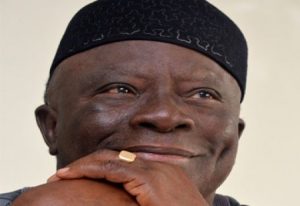The discourse of restructuring now dominating Nigerian politics is producing its practices. It is still at the level of verbal missiles but in which Dr Junaid Mohammed is calling Atiku Abubakar a nonentity whose wealth would not buy him the presidency in 2019. It flashes a signal of what may lie in store depending on how fast stakeholders move to manage the restructuring imbroglio, although such use of strong language is not strange to Dr Junaid’s political tendency in Nigerian politics – the People’s Redemption Party, (PRP). Whether it is the late Muhammadu Abubakar Rimi, Abdulkadir Balarabe Musa, Sule Lamido, the late Bala Usman or Dr Junaid himself, they all lack ability to hide tendency bile under tact or diplomacy in dealing with perceived tendency enemies. Otherwise, applying nonentity to someone else might be considered too strong. Not for any of the above actors who could even decline to shake hands, smile or recognise anyone perceived to be out to deal with the tendency.
The only difference is that, this time, the tendency might be enjoying region wide endorsement because Dr Junaid is calling the former Vice-President so after he dared to argue that those against restructuring Nigeria were acting out laziness. And that ethnic federation would best serve Nigeria. He was igniting the fury of a region that habours feeling of being at the receiving end of harassment and intimidation by those with media power to do so ‘because, if Nigeria were not working as those arguing for restructuring are saying, how did they end up controlling the commanding heights of the economy? And why is the restructuring campaign restricted to the political but not the economic realm?’
This is a common but uncommonly shared point of view in that there are several centres of power in the politics of restructuring when it comes to the northern region. What is rather commonly shared by both leftists and rightists is a kind of contempt and irritation for the threat element in the language of restructuring “by people who invoke due process, rule of law and democracy at every turn but choose threat over dialogue”. This is the point at which a PRP element such as Dr. Junaid might have been infuriated by Atiku’s analysis of opposition to restructuring as laziness, thereby declaring a tendency wrestling involving the ‘lazy’ ones against the ‘nonentities’. What a pity!

Chief Ayo Adebanjo, a NADECO chieftain
The exchange has its national ramifications but it is still essentially intra northern politics. But neither is the national scale any less acrimonious. The most significant must be the return of the National Democratic Coalition, (NADECO), declaring its stand as return to the regional structure that existed in 1963. In a statement credited to Rear Admiral Ndubusi Kanu (rtd), NADECO argued that what it calls the current sectionally foisted and configured unity by the past sectional military dictators that has kept other sections of Nigeria in servitude for too long is no longer acceptable to majority of Nigerians from more than four out of the six political zones in the country. Advising “All Concerned” to face this reality, it says also that the basic document for any genuine reconciliation agenda must be the 1963 Federal Republic Constitution as may be amended. This is the document it says was negotiated by Nigeria’s founding fathers, nationalists and leadership of the ethnic Nationalities.
Nigeria, said NADECO, in obvious reference to the recent ‘Operation Python Dance 11’ in the East, is back to military dictatorship as against self-determination which it says “is the anthem of this millennium”. For NADECO, national restructuring and return to Federalism are necessities whose time have come, adding the trademark threat of cataclysm from how everything wrong or disturbing today, “would and will be Child’s Play if we do not face the necessities whose time have come”.

Alhaji Tanko Yakassai
Although Alhaji Tanko Yakassai who has so far posed a contrary argument on Channels Television made it known that he was speaking for himself, his views can be taken as representative of the north, however we conceptualise the north. He accepts that Nigeria has been miniaturised into ineffectual entities called states but argued that the states were created on demand. He was, by implication, refuting the northern agenda thesis in the creation of the states, adding that his friends such as Ayo Adebanjo, (a NADECO chief) were in the vanguard of these demands. Taking on the substantive issue of restructuring, he buys into the idea of return to the 1963 arrangement as demanded by the Yoruba elders but spotted a contradiction in six regions the Yoruba elders added to the demand since Nigeria did not have six regions in 1963. In that, one can see a second guessing of the Yoruba elders or of the whole idea of restructuring as an agenda of territorial whittling down of the north. His last main point is correcting what he called misinformation about regions controlling 50% of resources in their domain. That, he said, was only in relation to solid mineral resources, not oil which is now carried out mainly off shore and, to that extent, belongs to Nigeria rather than any states in accordance with the position of international law.
Looking at the dominant sentiments in the two main contending positions, it is difficult to understand the point of conflict in the agitation if those sentiments are the real reasons because the opposing camps on restructuring are not that far from each other. This reinforces the belief in some quarters that there are unspoken premises in the restructuring agenda vis-a-vis the conflictual tone defining it so far. Those who subscribe to this view say that it is the unspoken premises we see in NADECO’s notions of “current sectionally foisted and configured unity by the past sectional military dictators that has kept other sections of Nigeria in servitude for too long” on the one hand and the rather unarticulated notion of restructuring as harassment of those without media power “because, if Nigeria were not working as those arguing for restructuring are saying, how did they end up controlling the commanding heights of the economy? And why is the restructuring campaign restricted to the political but not the economic realm?” In these two contrasting but unspoken or hidden premises lies the politics of restructuring and which makes it a fight between ‘winners’ and ‘losers’ of the hegemonic brawl of the Nigerian elite.
It is strictly an elite affair but that is not to say it has no implications for the non-elite. To that extent, it is apt to worry that the elite in Nigeria is not only again advertising historic elite failure for the whole world to see but also in a way that can create a humanitarian catastrophe that interrogates the African agency.





























1 Comments
Umar Bagudu
This’s a very good lesson for Atiku